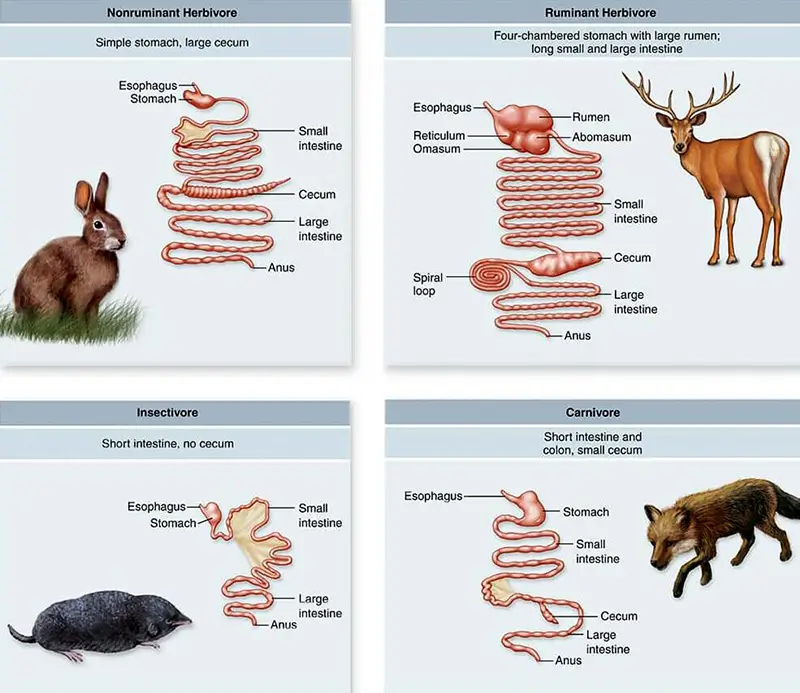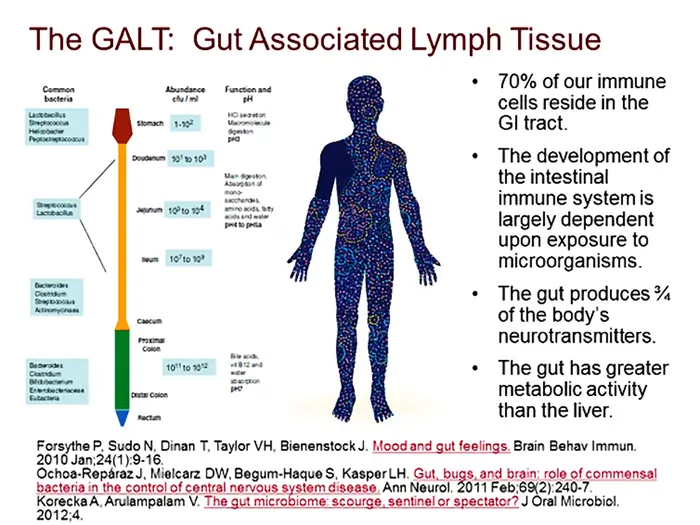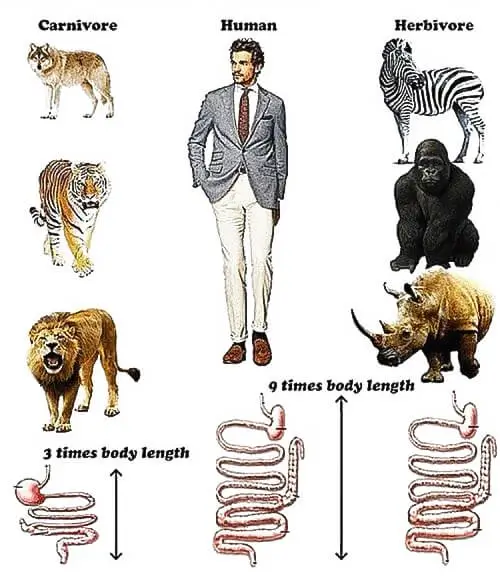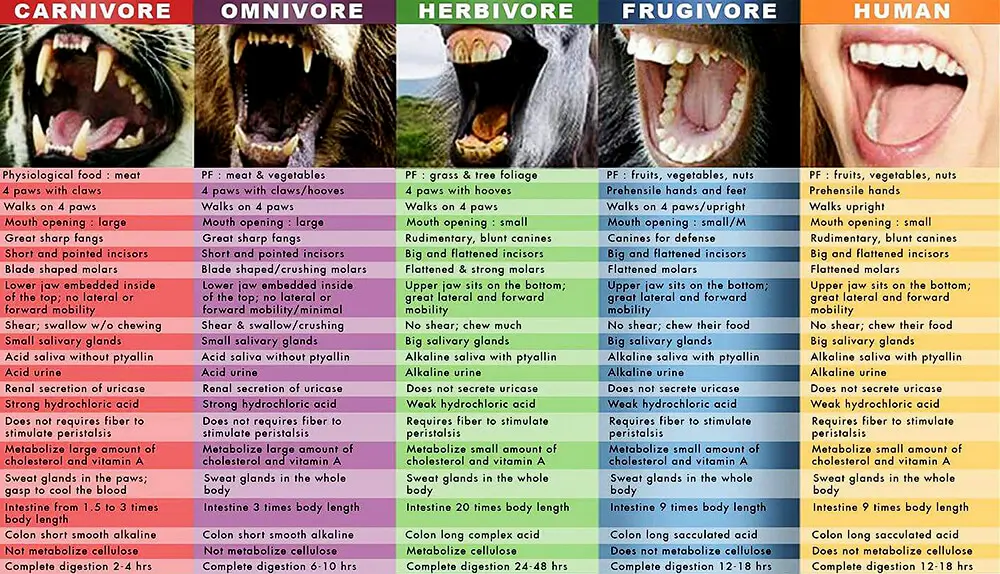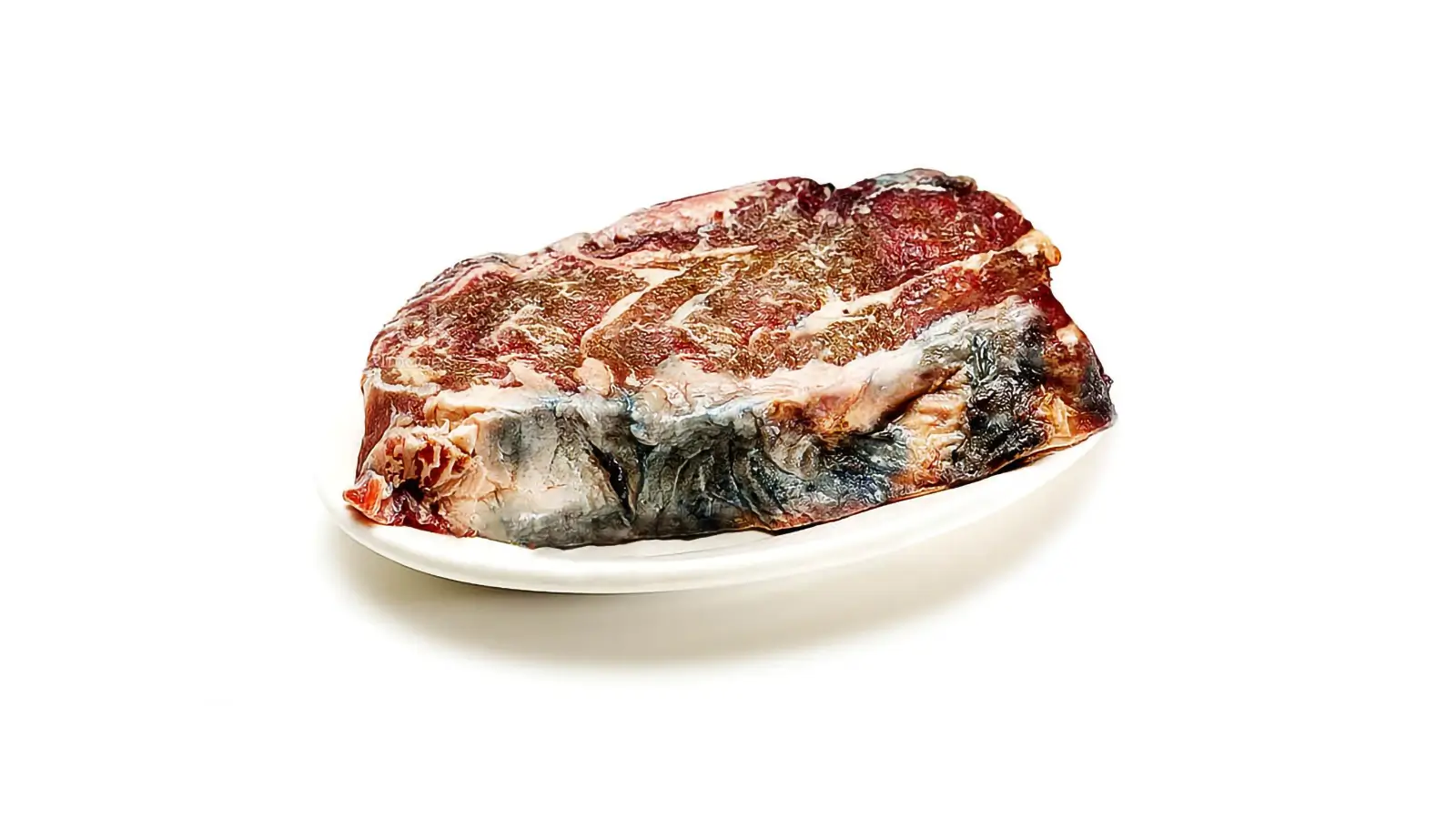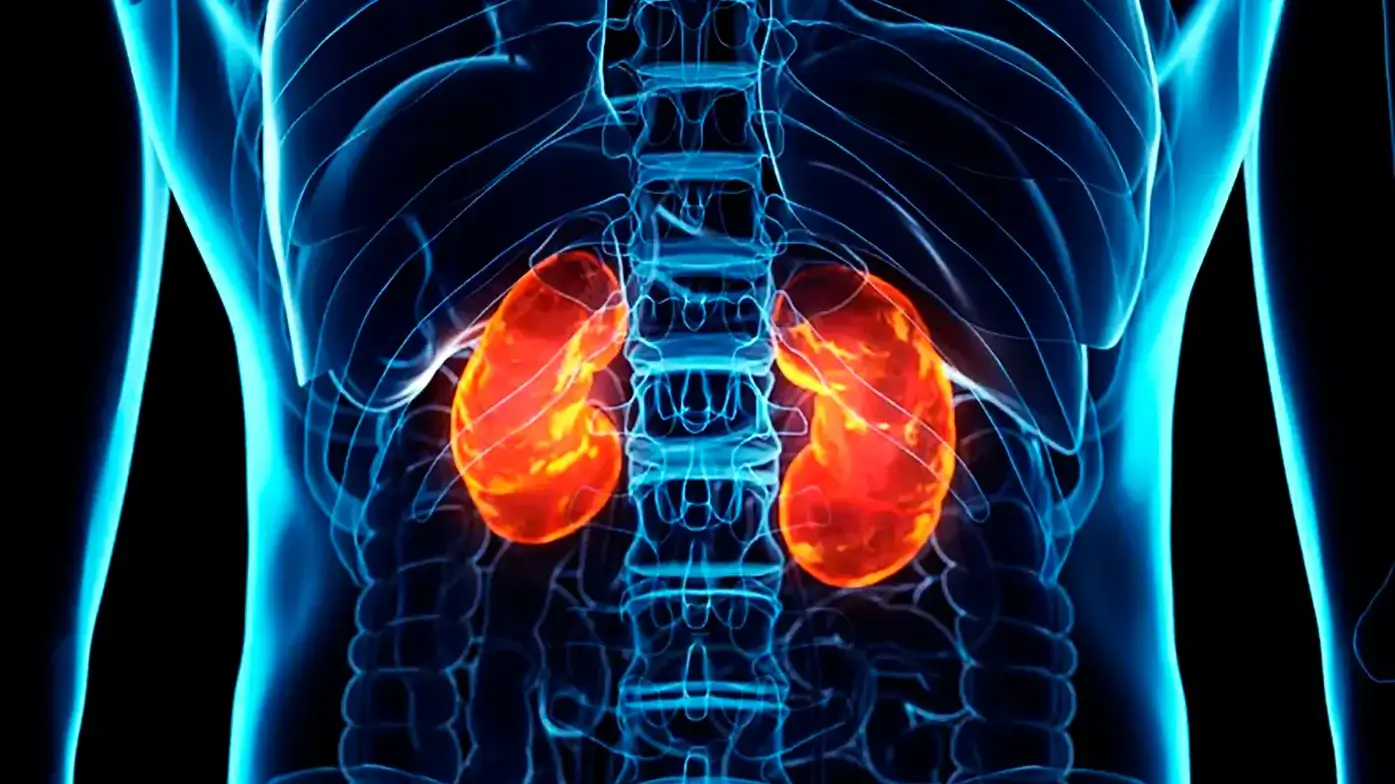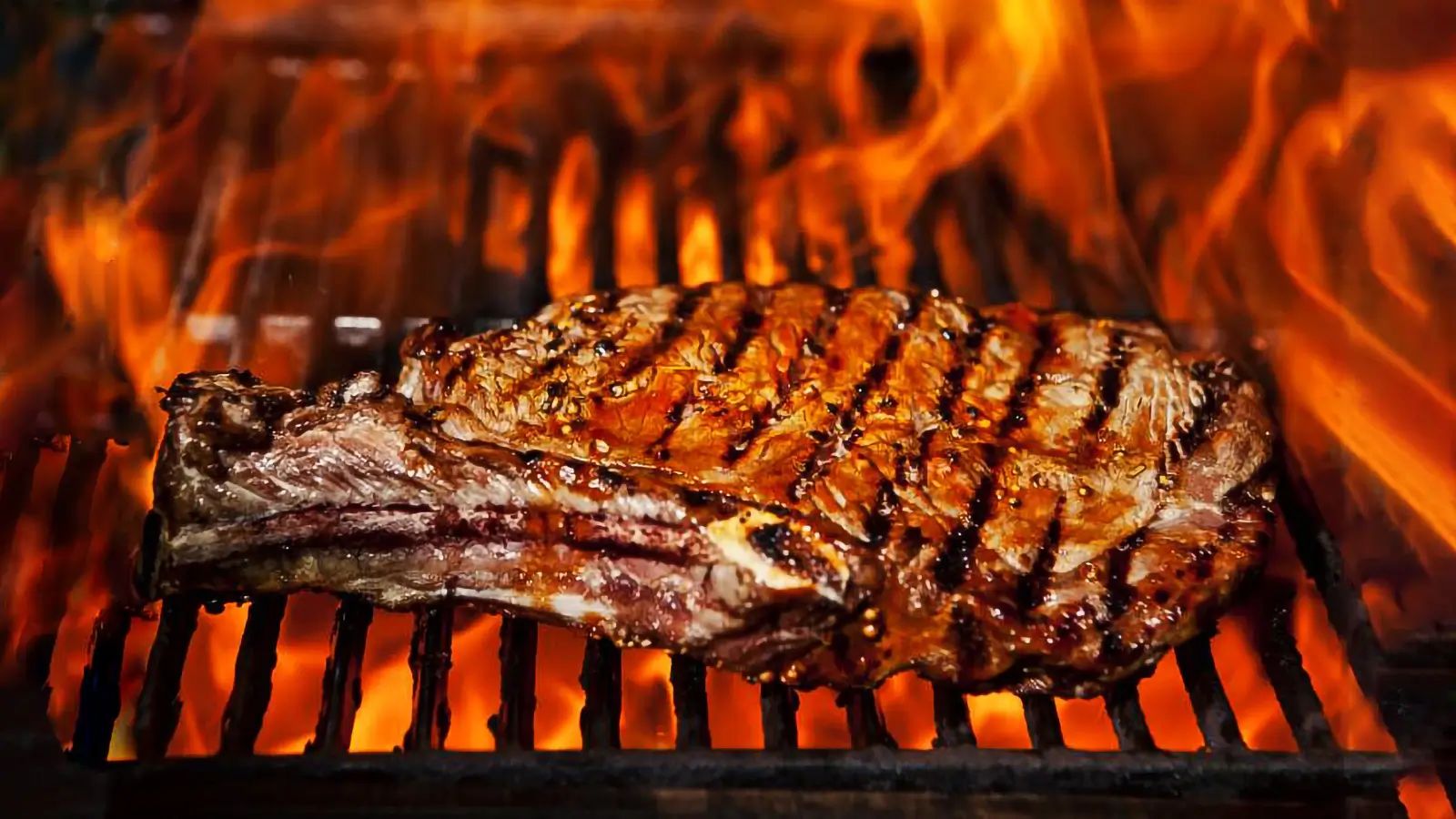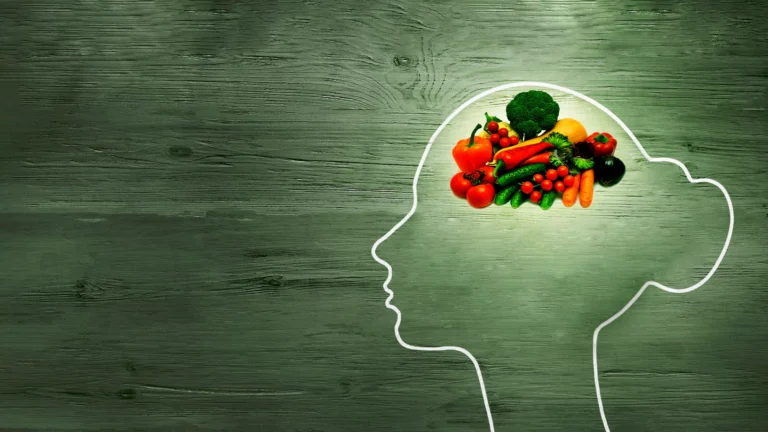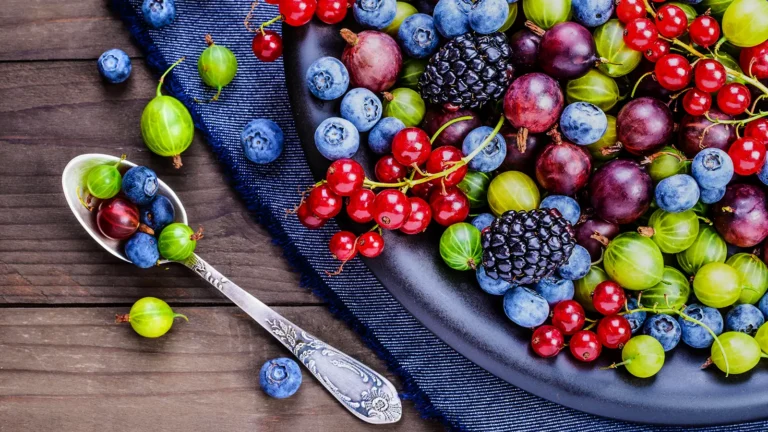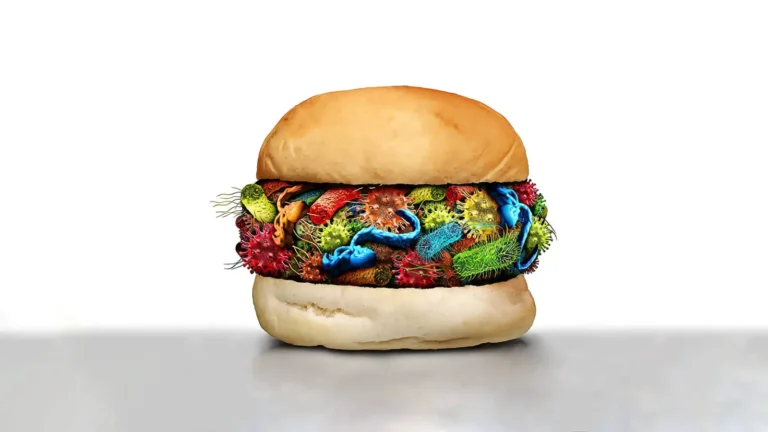Le Dilemme des Humains Omnivores- Consommation de Viande, Bactéries Probiotiques, Inflammation et Intestin
Les humains sont-ils omnivores au sens propre de l'anatomie ? Il existe une différence fondamentale dans le fonctionnement du tube digestif entre les plantes et les espèces carnivores.
Milos Pokimica
Écrit par : Milos Pokimica
Examiné Médicalement Par : Dr. Xiùying Wáng, M.D.
Mis à jour le 9 juin 2023Qu'est-ce qu'une alimentation humaine saine ? Les humains sont-ils omnivores et sommes-nous nés pour consommer de la viande ?
Les médecins, d'autres experts et la sagesse conventionnelle conviennent tous que les produits d'origine animale sont des composants nécessaires d'une alimentation saine et que les humains sont des omnivores. La majorité des gens croient également que les humains sont omnivores. Certains prétendent que les humains ont toujours mangé des produits d'origine animale. Par conséquent, ils doivent être naturels et sains.
Aujourd'hui, la majorité d'entre nous, soit 99 %, sommes des omnivores comportementaux (et non anatomiques), mais même cela est faux. Êtes-vous tenté de vous arrêter pour grignoter des animaux morts sur le bord de la route ? Rêvez-vous d'abattre des vaches à mains nues et de les manger crues ? Si vous avez répondu “ non ” à ces questions, vous n'êtes même pas un omnivore comportemental. Les chimpanzés sont encore plus omnivores comportementaux que nous. Dans certains cas, les chimpanzés tuent et mangent d'autres singes et animaux crus.
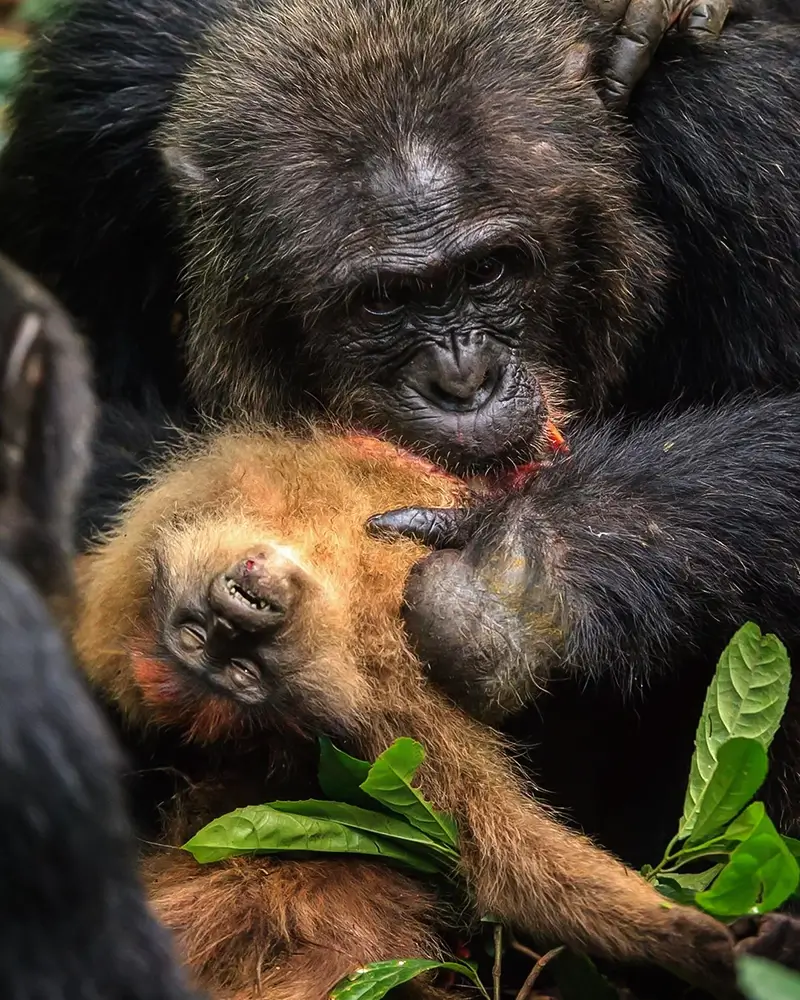
Bien que de nombreux êtres humains mangent à la fois des végétaux et de la viande, ce qui nous vaut le titre douteux d“” omnivores », nous sommes anatomiquement herbivores.
Il existe de nombreuses raisons pour lesquelles les humains consommeraient des produits d'origine animale alors qu'ils ne sont pas les meilleurs aliments pour nous, mais cela ne fait toujours pas des humains des omnivores. Par exemple, lorsque les premiers peuples ont migré vers le nord, ils ont fréquemment mangé des produits d'origine animale pour survivre car les produits végétaux adéquats n'étaient pas disponibles. Cela les placerait dans la même catégorie que les chimpanzés, uniquement des omnivores comportementaux.
Il existe également une pression culturelle importante en faveur de la consommation de produits d'origine animale. De nombreuses personnes ont grandi avec eux. Les religions affirment souvent que Dieu a créé les animaux pour que les humains les utilisent et les mangent. D'après la loi américaine sur l'alimentation, les animaux ont été créés pour être utilisés et mangés par l'homme. Lignes directrices en matière d'alimentationLes produits animaux font partie d'un régime alimentaire sain. Les entreprises alimentaires publient fréquemment des études faussées affirmant que les produits d'origine animale sont bons pour la santé. Les médecins apprennent souvent que ces aliments sont bons pour la santé.
Jusqu'à récemment, seuls les riches pouvaient se permettre de nourrir, d'élever et d'abattre des animaux pour la viande, tandis que le reste de la population mangeait principalement des aliments végétaux. En conséquence, avant le XXe siècle, seuls les riches étaient régulièrement atteints de maladies telles que les maladies cardiaques et l'obésité. Parce que la chair animale est devenue relativement bon marché et largement disponible grâce à la découverte d'engrais synthétiques (il faut 7 calories d'amidon pour faire une calorie de viande), des maladies mortelles telles que les maladies cardiaques, les accidents vasculaires cérébraux, le cancer, le diabète et l'obésité se sont propagées à personnes de tous les milieux socio-économiques. Les habitants des régions moins développées d'Asie et d'Afrique ont commencé à souffrir et à mourir de maladies associées aux régimes à base de viande à mesure que le mode de vie occidental se répand. Si nous consommons des protéines animales, cela ne rend pas automatiquement les humains omnivores.
Ce que les gens ne réalisent pas, c'est que les protéines animales peuvent être digérées et utilisées par tous les herbivores. Pas seulement par les humains. En tant qu'êtres vivants intelligents et supérieurs, les humains ont la capacité de modifier leur comportement et leur alimentation. Cependant, le fait que nous puissions survivre ou apprécier la consommation de produits d'origine animale ne signifie pas pour autant qu'il s'agisse d'aliments optimaux et sains pour les humains.
L'anatomie prime sur tout, y compris les croyances et les préférences alimentaires. Les caractéristiques anatomiques sont des faits observables. Ils démontrent objectivement les types d'aliments que nous et d'autres créatures avons évolué pour consommer et ainsi prospérer. En comparant les caractéristiques anatomiques des carnivores, des omnivores et des herbivores, la discussion suivante démontre que les humains sont des herbivores (Yates et al., 2021).
Les humains sont-ils omnivores au sens propre de l'anatomie ? Il existe une différence fondamentale entre le fonctionnement du tube digestif chez les espèces herbivores et carnivores. Il n'y a pas de bactéries dans le côlon des espèces carnivores car ce type de bactérie carnivore est très agressif et n'est pas probiotique. Le temps de transit des aliments dans le tube digestif chez les mangeurs de viande doit être court, pas plus de cinq à dix heures, sinon le système immunitaire peut être surchargé lorsque la viande commence à pourrir dans le côlon. Cela créera une inflammation et une intoxication alimentaire. De plus, l'acide gastrique chez les mangeurs de viande est beaucoup plus corrosif et leur tube digestif supérieur est essentiellement stérile.
Le gros intestin (côlon) des carnivores et des omnivores est donc simple et très court puisque sa seule fonction est d'absorber le sel et l'eau. Il a une largeur presque identique à celle de l'intestin grêle et, par conséquent, a une capacité limitée à fonctionner comme réserve. Bien qu'une population microbienne soit encore présente en grande quantité dans le côlon des carnivores, ses activités sont essentiellement putréfactives.
Chez les animaux herbivores, le gros intestin est un organe hautement spécialisé impliqué dans l'absorption d'eau et d'électrolytes, la production de vitamines et la fermentation des fibres végétales. Les colons des herbivores sont toujours plus complets que leur intestin grêle et sont relativement longs et remplis de bactéries probiotiques. Le microbiome du côlon chez l'homme a un rôle essentiel dans le fonctionnement normal de l'organisme.
D'une manière ou d'une autre, nous sous-estimons l'importance du côlon et pensons qu'il ne s'agit que d'un organe de déchet. Chez les carnivores, c'est le cas, chez nous, ce n'est pas le cas. Chez Homo sapiens et d'autres primates, le côlon est soumis à un éventail différent de fonctions. Par exemple, l'absorption d'eau et d'électrolytes et la production et l'absorption de vitamines. Il existe également une fermentation bactérienne extensive des fibres qui entraîne la production et l'absorption de différents métabolites et acides gras à chaîne courte par le côlon, ce qui fournit également des quantités importantes d'énergie et d'autres avantages pour la santé. Nous ne sommes pas en mesure d'utiliser toute la valeur énergétique de la fibre comme les brouteurs peuvent le faire, mais nous pouvons en utiliser une partie. La mesure dans laquelle la fermentation et l'absorption des métabolites ont lieu dans le côlon humain n'a commencé que récemment à être étudiée, et la recherche sur le microbiome est une nouvelle grande chose en raison de tous les produits chimiques que ces bactéries peuvent sécréter et de l'effet qu'elles ont sur notre corps. Ce ne sont pas seulement les vitamines que les bactéries probiotiques créent. Chaque produit chimique est une drogue possible.
La composition du microbiome dépend de la nourriture que nous mangeons. Un type fermente les fibres et un autre type putréfie la viande, et tous ne sont pas probiotiques.
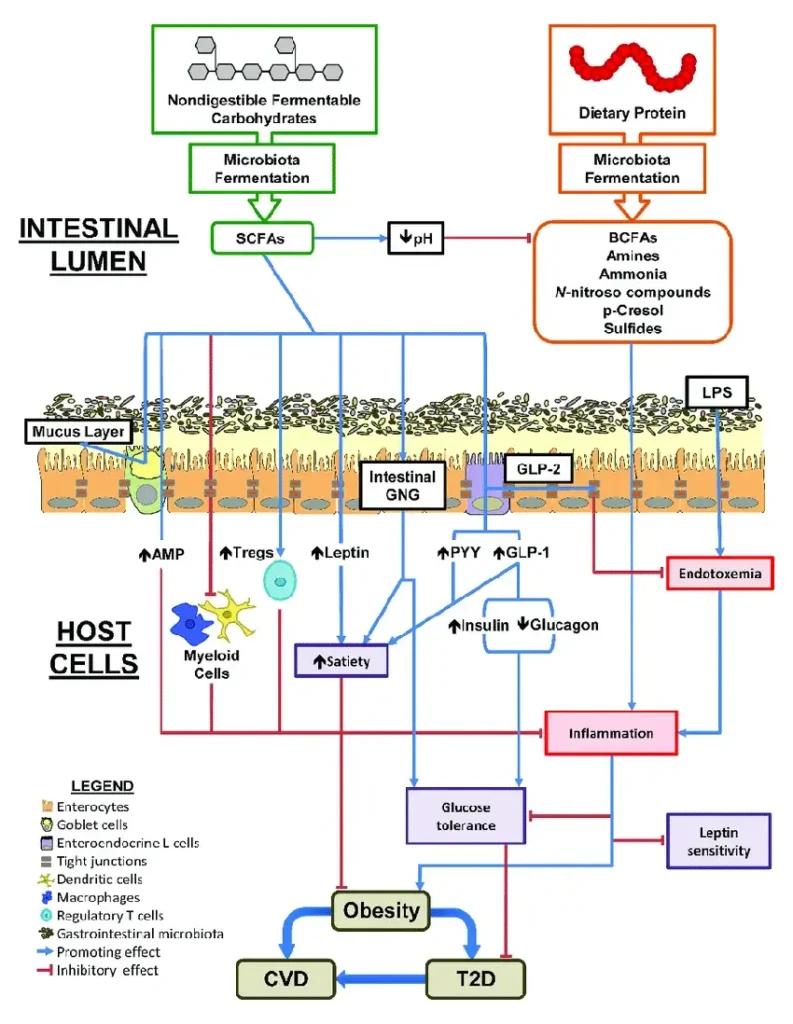
Pensez-y de cette façon, si des bactéries putréfient les haricots par exemple et que nous obtenons des gaz en conséquence, cela n'a pas un intérêt considérable pour nous. Nous ne sommes pas sa nourriture. Les bactéries aiment les haricots seulement. Les bactéries sont des organismes très spécialisés. Ils ne mangent pas tout. Un type mange des fibres, un autre type mange de la viande. Il vous aime aussi mais d'une manière différente. Vous êtes son hôte et vous lui donnez toute cette nourriture et un endroit où vivre avec humidité et chaleur afin qu'elle puisse vous aider à vivre plus longtemps parce qu'elle vous aime, mais d'une manière différente, elle n'aime pas votre viande.
Cependant, lorsque nous avons des bactéries qui putréfient les cadavres, nous sommes également au menu. La viande est de la viande, et la nôtre est savoureuse aussi. La plupart des gens ne réalisent pas que la majeure partie de notre système immunitaire, environ 60 à 70 %, se trouve en fait dans notre abdomen sous la forme d'un vaste système de réseaux lymphatiques appelé GALT (tissu lymphatique associé à l'intestin).
De plus, environ 80 % des plasmocytes, principalement des cellules porteuses d'immunoglobuline A (IgA), résident dans le GALT. Nous avons plus d'ADN étranger provenant de bactéries et d'autres micro-organismes symbiotiques en nous que le nôtre. Chez les animaux carnivores, en raison de l'acidité, la majeure partie du tractus gastro-intestinal supérieur est stérile. Lorsque la nourriture atteint le côlon, il ne peut y avoir d'envahisseurs étrangers, et la plupart des espèces déjà présentes de microbiote du côlon sont "gentilles". Lorsque nous mangeons de la viande, la situation est différente. Le tractus gastro-intestinal humain présente des modifications anatomiques compatibles avec un régime herbivore à faible acidité et à long temps de transit, de sorte que le potentiel de croissance de souches agressives de bactéries non symbiotiques est réel, et s'ils sont présents dans les aliments, ils peuvent coloniser la muqueuse intestinale et causent une présence constante pour notre système immunitaire. La raison du soi-disant équilibre entre les bactéries probiotiques et non probiotiques est à cause de cela. Nous avons toujours une grande partie de notre microbiome qui n'est pas symbiotique avec notre corps. Manger de la viande nourrit une grande partie de cette bactérie non symbiotique. Une forte consommation de produits d'origine animale et une faible consommation de fibres ne sont pas seulement associées à une augmentation du temps de transit et à la constipation. Ils sont également associés à l'augmentation du faible niveau d'inflammation chronique et du risque de cancer du côlon.
Lorsque nous consommons de la viande, celle-ci reste longtemps dans notre côlon et, comme nous ne sommes pas adaptés à une consommation importante de viande et de produits d'origine animale, cela a des effets négatifs, c'est ainsi. La prise de compléments probiotiques ne changera rien en termes de chiffres réels, car les bactéries se multiplient très rapidement lorsqu'elles disposent d'une source d'énergie. Si les bactéries se nourrissent de viande et que celle-ci reste dans notre tube digestif pendant plusieurs jours, cela entraîne une inflammation. Si nous consommons trop de produits d'origine animale à intervalles réguliers, nous aurons un mauvais microbiome dans notre côlon et une augmentation chronique de l'inflammation.
On peut se demander ce qui se passe dans le tube digestif des vraies espèces omnivores. Les vrais omnivores anatomiques ont-ils un côlon court ou long et fermentent-ils les fibres ? La composition de l'abdomen des carnivores est plus primitive que les adaptations herbivores avec une acidité plus élevée pour tuer les bactéries de la viande morte. Par conséquent, on s'attendrait à ce qu'un omnivore soit un carnivore qui montre certaines adaptations du tractus gastro-intestinal à un régime herbivore. C'est précisément la situation que nous avons trouvée chez les ratons laveurs, les ours et certains membres des familles canines. Les ours, par exemple, sont principalement des herbivores avec 70 à 80 % de leur régime alimentaire composé d'aliments végétaux. Parce que les ours incluent des quantités importantes de viande dans leur alimentation, ils doivent conserver les caractéristiques anatomiques qui leur permettent de capturer et de tuer leurs proies. Par conséquent, les ours ont une structure maxillaire, une musculature, et la dentition qui leur permettent d'appliquer les forces nécessaires pour tuer et démembrer leurs proies même si la majeure partie de leur alimentation est constituée d'aliments végétaux. L'adaptation la plus importante à un régime herbivore chez les ours est la modification de leurs dents. Les ours gardaient les incisives, les grosses canines et les tondeurs de prémolaires d'un carnivore; mais les molaires étaient carrées avec des cuspides arrondies pour écraser et broyer. Ils ont toujours une acidité élevée et un filtre à haute résistance et un côlon court. Ils ne peuvent pas digérer la végétation fibreuse et sont donc très sélectifs. Leur alimentation est dominée principalement par les herbes aromatiques, les tubercules et les baies. De nombreux scientifiques pensent que la raison pour laquelle les ours hibernent est due à leur nourriture principale (végétation succulente) qui n'est pas disponible pendant les hivers froids du nord.
Références :
- Arumugam , M. , Raes , J. , Pelletier , E. , Le Paslier , D. , Yamada , T. , Mende , DR , Fernandes , GR , Tap , J. , Bruls , T. , Batto , JM , Bertalan , M. , Borruel , N. , Casellas , F. , Fernandez , L. , Gautier , L. , Hansen , T. , Hattori , M. , Hayashi , T. , Kleerebezem , M. , Kurokawa , K. , .. Bork, P. (2011). Entérotypes du microbiome intestinal humain. Nature, 473(7346), 174–180. https://doi.org/10.1038/nature09944
- Moore, WE et Moore, LH (1995). Flores intestinales des populations à haut risque de cancer du côlon. Microbiologie appliquée et environnementale, 61(9), 3202–3207. https://doi.org/10.1128/aem.61.9.3202-3207.1995
- Tuohy, KM, Conterno, L., Gasperotti, M. et Viola, R. (2012). Régulation positive du microbiome intestinal humain à l'aide d'aliments végétaux entiers, de polyphénols et/ou de fibres. Journal of agricultural and food chemistry, 60(36), 8776–8782. https://doi.org/10.1021/jf2053959
- Hakansson, A., & Molin, G. (2011). Microbiote intestinal et inflammation. Nutriments, 3(6), 637–682. https://doi.org/10.3390/nu3060637
- Ferguson JF (2013). Microbes carnivores : les bactéries mangeuses de steak favorisent-elles l'athérosclérose ?. Circulation. Génétique cardiovasculaire, 6(3), 308–309. https://doi.org/10.1161/CIRCGENETICS.113.000213
- Hazen, SL et Brown, JM (2014). Les œufs comme source alimentaire pour la production microbienne intestinale de triméthylamine-N-oxyde. La revue américaine de nutrition clinique, 100(3), 741–743. https://doi.org/10.3945/ajcn.114.094458
- Glick-Bauer, M., & Yeh, MC (2014). L'avantage pour la santé d'un régime végétalien : explorer la connexion avec le microbiote intestinal. Nutriments, 6(11), 4822–4838. https://doi.org/10.3390/nu6114822
- Kellow, NJ, Coughlan, MT et Reid, CM (2014). Bénéfices métaboliques des prébiotiques alimentaires chez les sujets humains : une revue systématique des essais contrôlés randomisés. The British journal of nutrition, 111(7), 1147-1161. https://doi.org/10.1017/S0007114513003607
- Fellows Yates, JA, Velsko, IM, Aron, F., Posth, C., Hofman, CA, Austin, RM, Parker, CE, Mann, AE, Nägele, K., Arthur, KW, Arthur, JW, Bauer, CC, Crevecoeur, I., Cupillard, C., Curtis, MC, Dalén, L., Carlos, J., Drucker, DG, Escribano Escrivá, E., . . . Warinner, C. (2021). L'évolution et l'écologie changeante du microbiome oral des hominidés africains. Actes de l'Académie nationale des sciences, 118(20), e2021655118. https://doi.org/10.1073/pnas.2021655118
Articles Similaires
Vous avez des questions sur la nutrition et la santé ?
J'aimerais avoir de vos nouvelles et y répondre dans mon prochain post. J'apprécie votre contribution et votre opinion et j'ai hâte d'avoir de vos nouvelles bientôt. Je vous invite également à nous suivre sur Facebook, Instagram et Pinterest pour plus de contenu sur l'alimentation, la nutrition et la santé. Vous pouvez y laisser un commentaire et entrer en contact avec d'autres passionnés de santé, partager vos conseils et expériences, et obtenir le soutien et les encouragements de notre équipe et de notre communauté.
J'espère que ce billet a été instructif et agréable pour vous et que vous êtes prêt à mettre en pratique les connaissances que vous avez acquises. Si vous avez trouvé ce billet utile, veuillez le partager à vos amis et à votre famille qui pourraient également en bénéficier. On ne sait jamais qui peut avoir besoin de conseils et de soutien dans son parcours de santé.
– Vous pourriez aussi aimer –

Apprendre la Nutrition
Milos Pokimica est docteur en médecine naturelle, nutritionniste clinique, rédacteur en santé médicale et nutrition et conseiller en sciences nutritionnelles. Auteur de la série de livres Devenir vegetarien ? Examen des sciences, il exploite également le site Web de santé naturelle GoVeganWay.com
Avis de non-responsabilité médicale
GoVeganWay.com vous propose des critiques des dernières recherches liées à la nutrition et à la santé. Les informations fournies représentent l'opinion personnelle de l'auteur et ne sont pas destinées ni implicitement à remplacer un avis médical professionnel, un diagnostic ou un traitement. Les informations fournies sont fournies à titre informatif uniquement et ne sont pas destinées à remplacer la consultation, le diagnostic et/ou le traitement médical d'un médecin ou d'un prestataire de soins de santé qualifié.NE JAMAIS IGNORER LES CONSEILS MÉDICAUX PROFESSIONNELS OU RETARDER LA RECHERCHE DE SOINS MÉDICAUX EN RAISON DE QUELQUE CHOSE QUE VOUS AVEZ LU OU ACCÉDÉ SUR GoVeganWay.com
N'APPLIQUEZ JAMAIS DE CHANGEMENTS AU STYLE DE VIE OU TOUT CHANGEMENT À LA SUITE DE QUELQUE CHOSE QUE VOUS AVEZ LU SUR GoVeganWay.com AVANT DE CONSULTER UN PRATICIEN MÉDICAL AGRÉÉ.
En cas d'urgence médicale, appelez immédiatement un médecin ou le 911. GoVeganWay.com ne recommande ni n'approuve aucun groupe, organisation, test, médecin, produit, procédure, opinion ou autre information spécifique pouvant être mentionné à l'intérieur.
Choix de l'éditeur -
Milos Pokimica est rédacteur spécialisé dans la santé et la nutrition et conseiller en sciences nutritionnelles. Auteur d'une série de livres Devenir vegetarien ? Examen des sciences, il exploite également le site Web de santé naturelle GoVeganWay.com
Derniers articles –
Top Des Nouvelles Sur la Santé - ScienceDaily
- Alzheimer’s may begin with a silent drop in brain blood flowle février 24, 2026
Subtle changes in brain blood flow and oxygen use are closely linked to hallmark signs of Alzheimer’s, including amyloid plaques and memory-related brain shrinkage. Simple, noninvasive scans may one day help spot risk earlier—by looking at the brain’s vascular health, not just its plaques.
- Scientists engineer bacteria to eat cancer tumors from the inside outle février 24, 2026
Researchers are engineering bacteria to invade tumors and consume them from the inside. Because tumor cores lack oxygen, they’re the perfect breeding ground for these microbes. The team added a genetic tweak that helps the bacteria survive longer near oxygen-exposed edges — but only once enough of them are present to trigger the change. It’s a carefully programmed biological attack that could one day offer a new way to destroy cancer.
- Massive US study finds higher cancer death rates near nuclear power plantsle février 24, 2026
A sweeping nationwide study has found that U.S. counties located closer to operating nuclear power plants have higher cancer death rates than those farther away. Researchers analyzed data from every nuclear facility and all U.S. counties between 2000 and 2018, adjusting for income, education, smoking, obesity, environmental conditions, and access to health care. Even after accounting for those factors, cancer mortality was higher in communities nearer to nuclear plants, particularly among older […]
- Training harder could be rewiring your gut bacteriale février 24, 2026
Training harder may do more than build muscle—it could transform your gut. Researchers found that intense workouts change the balance of bacteria and important compounds in athletes’ digestive systems. When training loads dropped, diet quality slipped and digestion slowed, triggering different microbial shifts. These hidden changes might influence performance in ways scientists are only beginning to understand.
- Scientists reverse muscle aging in mice and discover a surprising catchle février 24, 2026
A UCLA study in mice reveals that aging muscle stem cells accumulate a protein that slows repair but boosts survival. This protein, NDRG1, acts like a brake, preventing cells from activating quickly after injury. When researchers blocked it in older mice, muscle healing sped up dramatically — but stem cells became less resilient over time. The work suggests aging may reflect a survival trade-off rather than straightforward decline.
- Less sugar as a baby, fewer heart attacks as an adultle février 23, 2026
People whose sugar intake was restricted before birth and in early childhood had markedly lower rates of heart disease later in life. Compared to those never exposed to rationing, their risks of heart attack, stroke, heart failure, and cardiovascular death were cut by roughly 20–30%.
- Scientists create universal nasal spray vaccine that protects against COVID, flu, and pneumoniale février 23, 2026
Scientists at Stanford Medicine have unveiled a bold new kind of “universal” vaccine that could one day protect against everything from COVID-19 and the flu to bacterial pneumonia and even common allergens. Instead of targeting a specific virus or bacterium, the nasal spray vaccine supercharges the lungs’ own immune defenses, keeping them on high alert for months. In mice, it slashed viral levels, prevented severe illness, and even blocked allergic reactions.
PubMed, #régime-vegan –
- Veganism: an extended theory of planned behavior framework incorporating ethical, environmental, and sociodemographic determinantsle février 20, 2026
CONCLUSION: This study broadens the TPB by integrating ethical, normative, and psychosocial dimensions that explain vegan intentions beyond traditional predictors. Findings underscore the importance of moral identity, perceived social expectations, and contextual factors in shaping sustainable dietary behaviors.
- Association Between Diet and Metabolome in Childhood and Adolescence: A Systematic Reviewle février 11, 2026
CONCLUSION: This review identifies several metabolites consistently associated with specific dietary components across different studies in children and adolescents. These findings support the potential of metabolomics for validating dietary biomarkers and improving the accuracy of dietary assessment in pediatric populations. Although metabolomic markers reflect actual dietary intake, their implications for health outcomes remain to be explored.
- Growth Trajectories in Infants From Families With Plant-Based or Omnivorous Dietary Patternsle février 5, 2026
CONCLUSIONS AND RELEVANCE: In this cohort study, infants from vegan households had growth patterns similar to those from omnivorous households, with a higher odds of early underweight that decreased by age 24 months. In the context of developed countries, these findings seem reassuring. Further research should examine vegan diet quality and the impact of nutritional counseling during pregnancy and infancy in supporting optimal infant development.
- Influences of vegan status on protein intake, lean body mass, and strength in lightly active, young women: A cross-sectional studyle février 5, 2026
CONCLUSION: These data suggest that functional indicators of body protein status may be adversely impacted by long-term adherence to vegan diets in young adult women.
- Iodinele janvier 1, 2006
Iodine is an essential trace nutrient for all infants that is a normal component of breastmilk. Infant requirements are estimated to be 15 mcg/kg daily in full-term infants and 30 mcg/kg daily in preterm infants.[1] Breastmilk iodine concentration correlates well with maternal urinary iodine concentration and may be a useful index of iodine sufficiency in infants under 2 years of age, but there is no clear agreement on a value that indicates iodine sufficiency, and may not correlate with […]
Messages aléatoires –
Postes en vedette -
Dernières Nouvelles de PubMed, #alimentation végétale –
- Differences in Protein Quantity and Quality Across a Spectrum of Plant-Based Meals: Analysis of a Large National Dietary Surveypar Sophie L van Oppenraaij le février 24, 2026
CONCLUSIONS: This study shows that only a small proportion of Dutch adults met both protein-related recommendations and sustainability goals, due to lower protein quantity and quality in more plant-based diets. This study emphasizes the need for professional guidance, especially in individuals with higher protein requirements, to facilitate a successful transition to a more plant-based diet.
- Evaluation of biochemical, histopathological, hematological, and genotoxic effects of some indigenous weed plant extracts in albino rats toward a natural and safe alternative to synthetic insecticidespar Muhammad Asif Zahoor le février 23, 2026
CONCLUSION: These findings suggest that these weed plants have the potential to be used as biopesticides for future integrated pest management (IPM) programs.
- Comparative life cycle assessment of conventional dairy products and plant-based analog and hybrid alternatives: current status and future perspectivespar Muhammed Fidan le février 23, 2026
Conventional dairy products are associated with relatively high environmental burdens, largely driven by farm-level processes such as enteric methane emissions, feed production, and land use. These concerns have intensified interest in plant-based analog and hybrid dairy products as potential alternatives. However, environmental comparisons among these product categories remain inconsistent due to differences in functional units, methodological choices, and nutritional characteristics. This…
- Dietary Patterns and Indicators of Cognitive Functionpar Hui Chen le février 23, 2026
CONCLUSIONS AND RELEVANCE: Results reveal that healthy diets, exemplified by the DASH diet for blood pressure control and diets with lower hyperinsulinemia and inflammation potentials, were associated with a lower SCD risk and better cognitive function. These findings underscore the importance of a healthy diet for maintaining long-term cognitive health.
- Adherence to the EAT-Lancet Planetary Health Diet during Pregnancy and Associations with Preterm Birth and Infant Size: a prospective analysis from the New Hampshire Birth Cohortpar Leyre Notario Barandiaran le février 21, 2026
CONCLUSION: Originally proposed for chronic disease prevention and planetary sustainability, higher adherence to the PHD during pregnancy may also benefit birth outcomes, particularly lower odds of preterm birth.
- Comparative effects of Gamal (Gliricidia sepium)-based diets supplemented with Gambier (Uncaria gambir) or direct-fed microbials on rumen fermentation, nutrient digestibility, microbial protein…par Bella Veliana Utami le février 20, 2026
CONCLUSION: Gamal-based diets supplemented with Gambier or DFM positively modified rumen fermentation, but through distinct mechanisms. DFM improved digestibility and fermentation stability, whereas Gambier achieved the greatest CH(4) mitigation at 1% inclusion. Gambier represents a promising, locally available option for sustainable methane reduction in tropical ruminant feeding systems, supporting future in vivo validation.

